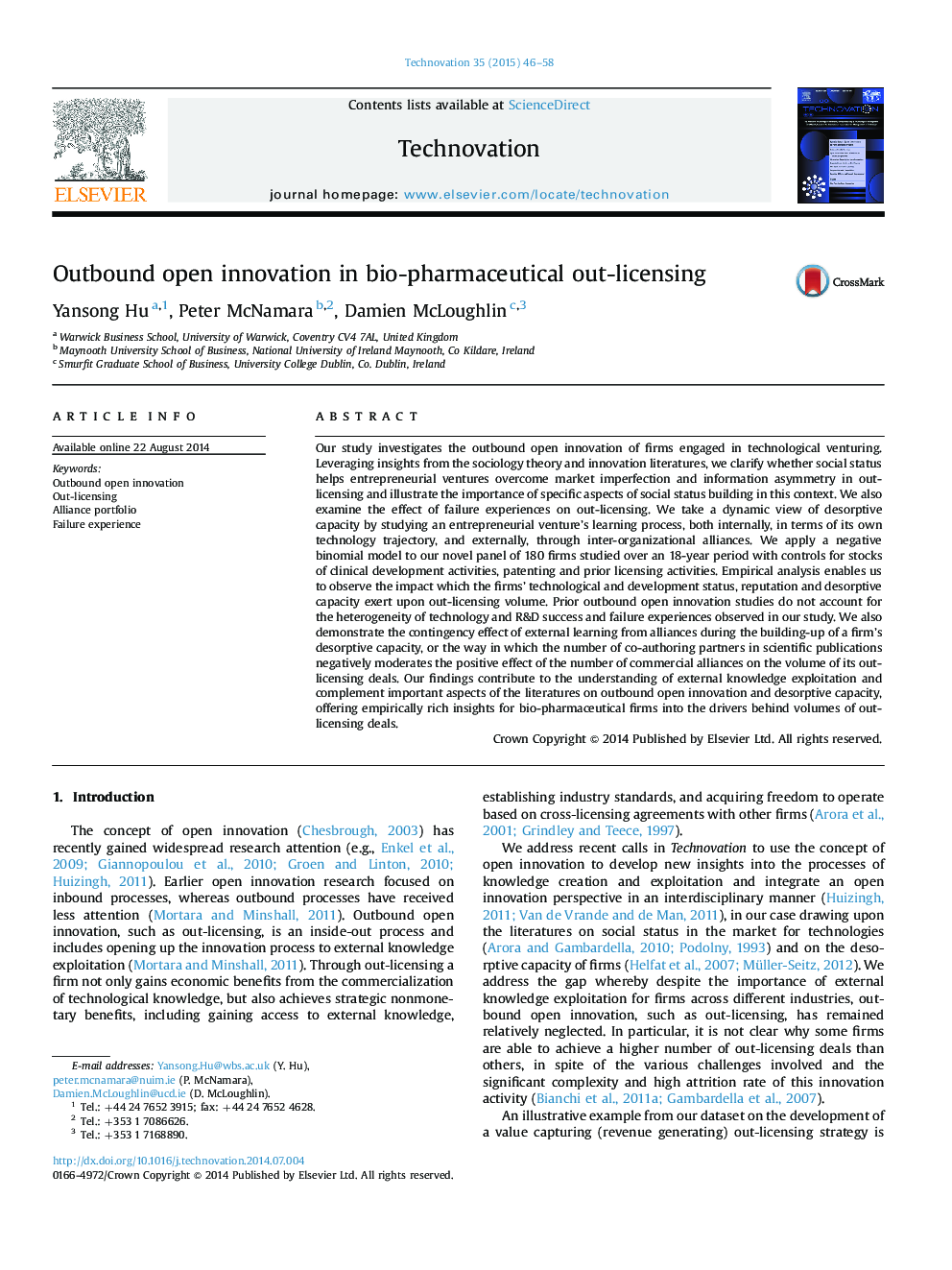| کد مقاله | کد نشریه | سال انتشار | مقاله انگلیسی | نسخه تمام متن |
|---|---|---|---|---|
| 7427349 | 1482949 | 2015 | 13 صفحه PDF | دانلود رایگان |
عنوان انگلیسی مقاله ISI
Outbound open innovation in bio-pharmaceutical out-licensing
ترجمه فارسی عنوان
نوآوری باز در خارج از مجوز بیوفیزیکی باز
دانلود مقاله + سفارش ترجمه
دانلود مقاله ISI انگلیسی
رایگان برای ایرانیان
کلمات کلیدی
نوآوری باز بیرون، خارج از مجوز، نمونه کارها اتحاد، تجربه شکست
ترجمه چکیده
تحقیقات ما نوآوری های بازاریابی در خارج از کشور را در بر می گیرد. از بین بردن بینش از نظریه جامعه شناسی و ادبیات نوآوری، ما روشن می کنیم که آیا وضعیت اجتماعی به سرمایه گذاری های کارآفرینی کمک می کند تا ناکارآمدی بازار و عدم تقارن اطلاعات در خارج از مجوز را غلبه دهند و اهمیت جنبه های خاصی از ساختن وضعیت اجتماعی در این زمینه را نشان دهند. ما همچنین بررسی اثر تجربیات شکست در خارج از مجوز را بررسی می کنیم. ما با بررسی یک فرآیند یادگیری سرمایه گذاری کارآفرینانه، از لحاظ مسیر تکنولوژی خود و از طریق همکاری های بین سازمانی، یک دیدگاه پویا از ظرفیت نفوذ پذیری را می سنجیم. ما یک مدل دوبعدی منفی را برای پانل رمانهای ما از 180 شرکت مورد مطالعه در طول یک دوره 18 ساله با کنترل برای سهام فعالیت های توسعه بالینی، ثبت اختراع و فعالیت های مجوز قبلی اعمال کردیم. تجزیه و تحلیل تجربی ما را قادر می سازد تا تأثیری را که وضعیت فناوری و توسعه، شهرت و ظرفیت نفوذ پذیری شرکت ها بر حجم صدور مجوز تأثیر می گذارند، مشاهده کنید. مطالعات پیشگام نوآوری باز از پیش تعیین شده برای ناهمگونی تکنولوژی و تجارب موفقیت و شکست تحقیق و توسعه در مطالعه ما گزارش نشده است. ما همچنین تأثیر احتمالی یادگیری خارجی را از اتحادیه ها در طول ساخت ظرفیت نفوذ پذیری شرکت یا نحوه تعدیل تعداد شرکای همکاری کننده در نشریات علمی منفی از تاثیر مثبت تعدادی از اتحادیه های تجاری در حجم معاملات خارج از مجوز آن. یافته های ما به درک سوء استفاده از دانش های خارجی کمک می کند و ملاک های مهم ادبیات را بر ظرفیت نوآوری باز و خروجی بیرون می زند و بینش های تجربی غنی را برای شرکت های زیست دارویی به راننده ها در پشت جلد معاملات خارج از مجوز می دهد.
موضوعات مرتبط
علوم انسانی و اجتماعی
مدیریت، کسب و کار و حسابداری
کسب و کار و مدیریت بین المللی
چکیده انگلیسی
Our study investigates the outbound open innovation of firms engaged in technological venturing. Leveraging insights from the sociology theory and innovation literatures, we clarify whether social status helps entrepreneurial ventures overcome market imperfection and information asymmetry in out-licensing and illustrate the importance of specific aspects of social status building in this context. We also examine the effect of failure experiences on out-licensing. We take a dynamic view of desorptive capacity by studying an entrepreneurial venture's learning process, both internally, in terms of its own technology trajectory, and externally, through inter-organizational alliances. We apply a negative binomial model to our novel panel of 180 firms studied over an 18-year period with controls for stocks of clinical development activities, patenting and prior licensing activities. Empirical analysis enables us to observe the impact which the firms' technological and development status, reputation and desorptive capacity exert upon out-licensing volume. Prior outbound open innovation studies do not account for the heterogeneity of technology and R&D success and failure experiences observed in our study. We also demonstrate the contingency effect of external learning from alliances during the building-up of a firm's desorptive capacity, or the way in which the number of co-authoring partners in scientific publications negatively moderates the positive effect of the number of commercial alliances on the volume of its out-licensing deals. Our findings contribute to the understanding of external knowledge exploitation and complement important aspects of the literatures on outbound open innovation and desorptive capacity, offering empirically rich insights for bio-pharmaceutical firms into the drivers behind volumes of out-licensing deals.
ناشر
Database: Elsevier - ScienceDirect (ساینس دایرکت)
Journal: Technovation - Volume 35, January 2015, Pages 46-58
Journal: Technovation - Volume 35, January 2015, Pages 46-58
نویسندگان
Yansong Hu, Peter McNamara, Damien McLoughlin,
